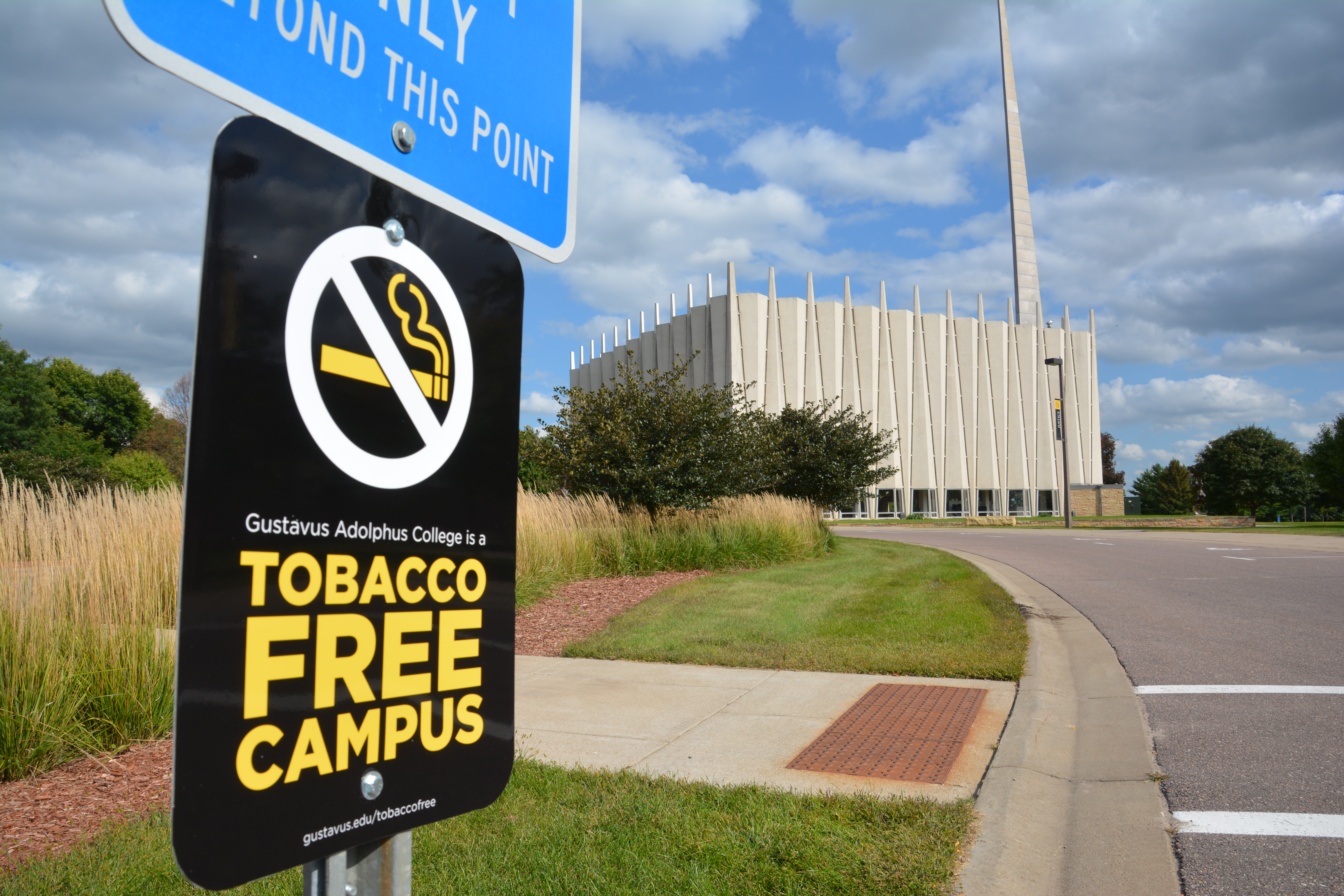Gustavus Adolphus College often finds itself at the center of heated debates when it announces major changes.
This past spring, on May 21, 2018, Gustavus President Bergman sent an email to the student body announcing that Gustavus would become a tobacco-free campus on July 1.
If students are caught using tobacco, smokeless tobacco, vaporizing devices, or e-cigarettes, they will be punished with a heavy fine.
This policy was considered for years by a Health Services committee as they further explored the idea.
After receiving feedback from campus representatives, they urged the Cabinet to implement the policy in order for Gustavus to become a healthy and safe environment for all individuals.
“By going tobacco-free, Gustavus joins nearly 2,000 other higher education institutions across the country in asking its community to refrain from using tobacco in all forms. This policy will apply to all College grounds including buildings, outdoor spaces, athletic facilities, and the Linnaeus Arboretum,” President Bergman said.
The goal was to make the campus a healthier place.
Several employees and student-led groups pointed out the harmful consequences of using tobacco, along with second-hand smoke that non-users breathe in.
They also argued that 95 percent of adult tobacco smokers started before the age of twenty one, and tobacco use is the number one source of preventable death in the United States.
Campus representatives also said that many public places are tobacco-free, so the ban prepares students for real-world experiences after they graduate.
Health Services looked at various statistics that proved the detriments of tobacco use and secondhand smoke on a person’s health, which ultimately leads to death.
Over the duration of ten years, Health Services has been working toward the tobacco-free initiative with Nicollet County under the Statewide Health Improvement Partnership, commonly referred to as SHIP.
With SHIP, they have acquired data through surveys, and have considered recommendations from nationally recognized associations at other colleges.
Gustavus Health Services Nurse Practitioner, Nissa Fell, rejoiced at the advantages this policy will bring to the whole Gustavus community.
“Benefits include joining 49 other Minnesota colleges and universities that are tobacco free. The city of Saint Peter has passed the Tobacco-21 law and thus we feel a strong partnership between the Gustavus community and the community of Saint Peter in promoting the health and well-being of our youth. President Bergman has always supported the policy but she alone did not pass it. The President’s Cabinet, which includes the Vice Presidents of the College and the Board of Trustees, all fully support the policy,” Fell said.
In addition to the huge role Health Services played, the Dean of Students Office was also highly influential in getting the rule passed.
Vice President for Student Life and Dean of Students, JoNes VanHecke, weighed in with her remarks.
“The Dean of Students Office has been supportive of the initiative [and] new policy and has played an advisory role in the implementation of it.” Fell also provided substantial leadership in advocating for both the initiative and implementation.
The Office of Marketing and Communication was also heavily involved in the process.
“Health Services, Peer Education, and the Chemical Health Offices are [all] available to assist any interested Gustavus community members with cessation support,” VanHecke said.
Even though there has been wide support for the tobacco-free initiative, it has also received heavy criticism and backlash.
Three days following the announcement by President Bergman, former Student Senate Co-President, Solveig Svendsen, sent out a statement on behalf of the 2017-2018 Student Senate, “Despite the claim that feedback was sought from campus constituents, students have voiced concern that not enough effort was made to explicitly determine if the student body supported the full ban, nor the timeline for the ban made transparent,” Svendsen wrote.
Student Senate also voted against releasing a photo endorsement that would support the initiative as a formal protest.
The statement continued by stating that while “it cannot be expected that those who use tobacco can, or ought to quit in a short time frame, nor can easily get off-campus.
While it is the right of a private institution to ban the use of a legal substance, this effort is in direct conflict with Gustavus’ core value of community: “civility, mutual respect, cooperation, shared governance and a pervasive sense of concern for every member of the Gustavus community are hallmarks of the College. [These] values have been blatantly ignored as this initiative failed to provide a public forum for all stakeholders, and failed to allow all campus members to democratically come to this decision. Student Senate is overwhelmingly disappointed by this lack of transparency.” While students and faculty continue to thrive on the hill, adjustment to this new policy is still taking place.
Student Senate also voted against releasing a photo endorsement that would support the initiative as a formal protest.
The statement continued by stating that while “it cannot be expected that those who use tobacco can, or ought to quit in a short time frame, nor can easily get off-campus.
While it is the right of a private institution to ban the use of a legal substance, this effort is in direct conflict with Gustavus’ core value of community: “civility, mutual respect, cooperation, shared governance and a pervasive sense of concern for every member of the Gustavus community are hallmarks of the College. [These] values… have been blatantly ignored as this initiative failed to provide a public forum for all stakeholders, and failed to allow all campus members to democratically come to this decision. Student Senate is overwhelmingly disappointed by this lack of transparency.”
While students and faculty continue to thrive on the hill, adjustment to this new policy is still taking place.
